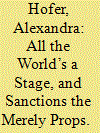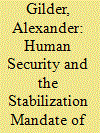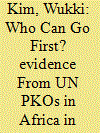|
|
|
Sort Order |
|
|
|
Items / Page
|
|
|
|
|
|
|
| Srl | Item |
| 1 |
ID:
177858


|
|
|
|
|
| Summary/Abstract |
This article argues that sanctions are interactional tools; their interactive nature is evident if these measures are considered as a form of stigmatization, which is the outcome of an interaction between the group imposing the stigma and the actor that is stigmatized. Stigmatized states do not always accept the label that is placed upon them and can adopt strategies to counter or resist stigma. From a symbolic interactionalist perspective, this can be understood as a state’s foreign policy role. Such an approach is illustrated through a study of Russia’s response to being sanctioned by the EU and the US for its policies in the Ukrainian crisis. It is argued that Russian leaders are unlikely to cave into Western pressure because they reject the role of deviant that is placed upon their state and instead adopt the role of the ‘untouchable’ state, which is consistent with Russia’s great power identity. Though the sanctions may enable the EU and the US to activate their roles as normative powers, in the context of the Ukrainian crisis, they have locked the parties into roles that contribute to the crisis’ duration.
|
|
|
|
|
|
|
|
|
|
|
|
|
|
|
|
| 2 |
ID:
177855


|
|
|
|
|
| Summary/Abstract |
This article looks narrowly at whether a ‘human security’ approach can be seen in a UN peace operation that pursues stabilization, namely the United Nations Multidimensional Integrated Stabilization Mission in the Central African Republic (MINUSCA). The UN’s interpretation of stabilization has not been expressly set out, but stabilization missions typically work alongside the host state to extend state authority and use robust force to counter spoilers. Human security is a concept which is rights-based, promotes the ‘vital core’, has a concern for vulnerability, utilizes preventative protection methods, and empowers local persons to have agency in the peace process. Attempts have been made to institutionalize and mainstream human security practices within the UN. An analytical framework of human security is outlined in this article and used to assess to what extent the mandate of MINUSCA pursues human security-based goals. An extensive review of UN documentation looks at the mandate and practice of MINUSCA and it is argued that the mission does seek to empower local people, engage in a bottom-up manner and entrench the rule of law. The analytical framework also casts light on aspects of the stabilization mandate which are problematic such as militarization and cooperation with the host state.
|
|
|
|
|
|
|
|
|
|
|
|
|
|
|
|
| 3 |
ID:
177859


|
|
|
|
|
| Summary/Abstract |
Despite the importance of having continuity in third-party involvement, many third parties lack the ability to commit as long-term peace guarantors. We argue that non-state actors and third parties with vested interests in peace and stability will be more likely to sustain involvement in post-conflict periods. Analysis of monthly level data from the Managing Intrastate Conflict (MIC) project confirms that third parties that have had wartime experience as conflict managers are more likely to get involved in post-conflict peace processes, regardless of whether the conflict management is in the form of peacekeeping missions, mediation or good offices; regardless of whether the third party is geographically proximate; and regardless of whether the third party is a state or non-state actor. The results also confirm that third-party geographic proximity and other measures of vested interests additively increase the propensity for postwar involvement. However, wartime conflict management experience matters less for third parties with vested interests, suggesting the additional importance of demand-side determinants of third-party conflict management.
|
|
|
|
|
|
|
|
|
|
|
|
|
|
|
|
| 4 |
ID:
177854


|
|
|
|
|
| Summary/Abstract |
Over the past two decades, the international Women, Peace and Security (WPS) agenda has established a commitment to increase the participation of women in matters of peace and security, to ensure the protection of women's rights, and to include gender perspectives in conflict prevention. The WPS agenda foresees a number of measures to make peacekeeping more gender-responsive, including training uniformed peacekeepers on gender. These policy commitments date back to the year 2000, and have instigated the development of training materials and the institutionalization of training at regional and national levels. This article examines these training mandates, asking: What is the scope and nature of gender training for peacekeepers? How is gender understood to operate in peacekeeping? A review of international and national policy commitments demonstrates that training uniformed peacekeepers on gender has become a significant transnational practice. An examination of these mandates and training guidance reveals that training discourse establishes a normative understanding of gender that is focused primarily on vulnerability to sexual violence, and that frames gender as a question of skills and capacities rather than political investments or moral values. However, differences in localization demonstrate that gender training could be and sometimes is understood more expansively.
|
|
|
|
|
|
|
|
|
|
|
|
|
|
|
|
| 5 |
ID:
177857


|
|
|
|
|
| Summary/Abstract |
The peacekeeping literature has primarily documented correlations between peacekeeping operations (PKOs) and their effectiveness or has focused on the decisions of troop-contributing countries participating in PKOs. Unlike the extant research, this paper shifts the focus to the decision-making process within PKOs. More specifically, this paper focuses on the timing of peacekeeper deployment by investigating how contributor leaders are distinguished from contributor followers. To tackle this topic, I use deployment-map data from 13 UN PKOs in Africa from 1990 to 2016. When a leader country deploys to a region before other countries, the followers will thus face an incentive to free ride because waiting to deploy to the region until it is secure is less risky. In short, there is a second-mover advantage that induces other countries to delay deployment until much later in a given UN PKO’s designated deployment window. This study finds that countries that could deploy more troops at their initial time of deployment and that have many previous UN PKO experiences are more likely to be leaders. Results also suggest that contributors engaging in multiple UN PKOs contemporaneously are less likely to be leaders.
|
|
|
|
|
|
|
|
|
|
|
|
|
|
|
|
|
|
|
|
|